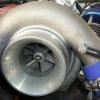Whats The Difference Between The Best Oils
Announcements
-
Similar Content
-
Latest Posts
-
By TurboTapin · Posted
If your head gasket lifted, you should have seen a coolant pressure spike. There's no need for a copper gasket/fire rings at 30psi. An MLS with perfectly clean/flat mating surfaces should suffice. -
I can see between the water jacket and cyl 3 there wasn't a hard line of combustion gas. It certainly appears that the issue is coming from there. Yes, checked the tension. All at 100ft lbs where I set them 5 years ago. These blocks can crack but generally when they have been over bored. Mine is only 0.5mm oversize at 89.5mm. They break between cylinders around the 91mm mark. No sign of that with mine. My gut feeling is the head gasket lifted a while back when the studs stretched and i bandaided it by retorquing the studs. It's finally let go.
-
By TurboTapin · Posted
My Nismo 1.5 churps a bit on reverse turns when cold, but besides that feels like a stock diff.
-








Recommended Posts
Create an account or sign in to comment
You need to be a member in order to leave a comment
Create an account
Sign up for a new account in our community. It's easy!
Register a new accountSign in
Already have an account? Sign in here.
Sign In Now